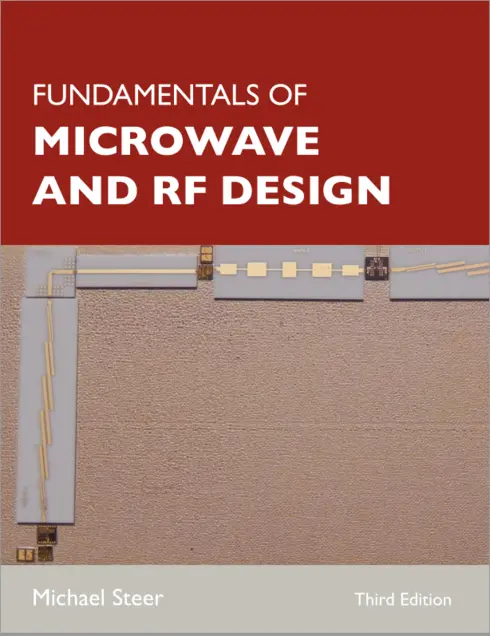
Fundamentals of Microwave and RF Design
![]()
![]()
![]()
![]()
![]()
Michael Steer, NC State
Copyright Year:
Publisher: North Carolina State University Libraries
Language: English
Formats Available
Conditions of Use
![]() Attribution-NonCommercial
Attribution-NonCommercial
CC BY-NC
Reviews
Reviewed by Timothy Brooks, Instructor - Electrical Engineering, Hanover College on 4/23/21
The great thing about engineering is the basic theory remains the same. This book was published in 2019 and contains updated technology. One example is cell phone technology. Doing so drives home the technology to an application students are... read more
![]()
![]()
![]()
![]()
![]()
Reviewed by Timothy Brooks, Instructor - Electrical Engineering, Hanover College on 4/23/21
Comprehensiveness
The great thing about engineering is the basic theory remains the same. This book was published in 2019 and contains updated technology. One example is cell phone technology. Doing so drives home the technology to an application students are familiar with.
Content Accuracy
No errors were noted.
Relevance/Longevity
This book could supplement either an electronics communications course, a course on electromagnetics or a stand alone course on RF/Microwaves.
Clarity
As an instructor, I had no issues. However, a casual student may find it more challenging. My students had no issues.
Consistency
Formatting is consistent
Modularity
I used this resource in a communications course. I found the chapters could stand alone for specific subject matter, with minimal references to prior chapters.
Organization/Structure/Flow
Well organized.
Interface
The pdf does not have a table of contents with hyperlinks. That would ease navigation.
Grammatical Errors
I am old school. I like books that teach technology in the third person.
Cultural Relevance
Like most engineering subjects, this books sticks to the theory.
CommentsThis book is a summary of four volume set of the same subject matter by the same author. I have used both this text book and selected books from his separate volumes. Excellent resource.
Reviewed by Keye Sun, Research Scientist, University of Virginia on 5/6/20
The book includes some of the topics in microwave engineering. However, lots of very important topics are missed. If this book only focuses on passive structures, at least the power combiner, splitter, filter should be added. read more
![]()
![]()
![]()
![]()
![]()
Reviewed by Keye Sun, Research Scientist, University of Virginia on 5/6/20
Comprehensiveness
The book includes some of the topics in microwave engineering. However, lots of very important topics are missed. If this book only focuses on passive structures, at least the power combiner, splitter, filter should be added.
Content Accuracy
Equations are clear and easy to follow.
Relevance/Longevity
The contents are relatively easy to follow.
Clarity
Equations are clear.
Consistency
Notations are clear and consistent.
Modularity
I think more chapters should be included such as filter design and power combiner and splitter.
Organization/Structure/Flow
Chapters are not so well organized. Important passive structures such as filters and power combiners, splitters are not introduced before the topic suddenly jumps into active components.
Interface
The text is clear.
Grammatical Errors
Good gramma.
Cultural Relevance
Very good.
CommentsI think the book can be further improved by carefully adding more important topics into it.
Table of Contents
- 1 Introduction to Microwave Engineering
- 2 Antennas and the RF Link
- 3 Transmission Lines
- 4 Planar Transmission Lines
- 5 Extraordinary Transmission Line Effects
- 6 Coupled Lines and Applications
- 7 Microwave Network Analysis
- 8 Graphical Network Analysis
- 9 Passive Components
- 10 Impedance Matching
- 11 RF and Microwave Modules
About the Book
Fundamentals of Microwave and RF Design enables mastery of the essential concepts required to cross the barriers to a successful career in microwave and RF design. Extensive treatment of scattering parameters, that naturally describe power flow, and of Smith-chart-based design procedures prepare the student for success. The emphasis is on design at the module level and on covering the whole range of microwave functions available. The orientation is towards using microstrip transmission line technologies and on gaining essential mathematical, graphical and design skills for module design proficiency. This book is derived from a multi volume comprehensive book series, Microwave and RF Design, Volumes 1-5, with the emphasis in this book being on presenting the fundamental materials required to gain entry to RF and microwave design. This book closely parallels the companion series that can be consulted for in-depth analysis with referencing of the book series being familiar and welcoming.
About the Contributors
Author
Michael Steer is the Lampe Distinguished Professor of Electrical and Computer Engineering at North Carolina State University. He received his B.E. and Ph.D. degrees in Electrical Engineering from the University of Queensland. He is a Fellow of the IEEE and is a former editor-in-chief of IEEE Transactions on Microwave Theory and Techniques. He has authored more than 500 publications including twelve books. In 2009 he received a US Army Medal, “The Commander’s Award for Public Service.” He received the 2010 Microwave Prize and the 2011 Distinguished Educator Award, both from the IEEE Microwave Theory and Techniques Society.
